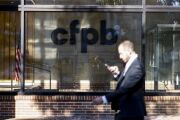
Rohit Chopra, the director of the Consumer Financial Protection Bureau, refused to say that he would step down from his role when President Trump takes office in January, implying in congressional testimony Wednesday that the president would have to fire him.
In testimony before the Senate Banking Committee, Chopra was questioned by ranking member Sen. Tim Scott, R-S.C., about whether the CFPB director planned to resign on Jan. 20.
Chopra responded: "As you know, we serve and are confirmed for a five-year term. The president can remove us at any time, any day, and obviously, we completely respect that."
Sen. John Kennedy, R-Louisiana, followed up by asking Chopra if the president could fire him.
"Yes, of course," Chopra said. "We serve at the pleasure of the president."
The nearly two-hour hearing provided a glimpse into how Republicans plan to rein in the CFPB and also highlighted the major differences between the two parties on a range of consumer protection issues from medical debt to digital surveillance, credit card interest rates to financial fraud.
Scott, who takes over next year as chairman of the panel — formally known as the Senate Committee on Banking, Housing and Urban Affairs — said changes at the CFPB "are absolutely necessary."
He criticized Chopra for refusing to halt rulemaking in the waning days of the Biden administration and instead advancing an agenda "at a breakneck speed" by issuing last-minute rules that Republicans would have to overturn by introducing joint resolutions next year under the Congressional Review Act.
Since the election, the CFPB has issued
The CFPB also
"The agency is unaccountable to Congress, and Director Chopra seems intent on proving this to be true," Scott said.
Chopra said, "I don't think it makes sense for the CFPB to be a dead fish. People between election day and inauguration day are still getting scammed. They're still being the victims of so much wrongdoing."
There is no requirement for federal agencies to abstain from issuing new rules or regulations during a changeover in administrations.
As an example, at the end of Trump's first term in 2020, the Federal Deposit Insurance Corp. passed both a broker deposit rule and a new industrial loan company rule, which were later overturned by the Biden administration.
Republicans are widely expected to try to pass bills next year that would turn the CFPB's single-director structure into a five-member commission and subject the bureau to congressional appropriations. In May,
Sen. Katie Britt, R-Alabama, raised some of the same concerns as Scott.
"The CFPB is the only financial agency that has continued to push out last-second rulemaking," Britt said. "In my opinion, that is unacceptable and reforming the CFPB should be an immediate priority for the next Congress."
Chopra generally dodged Republican criticism by arguing that some of the CFPB's proposals have bipartisan support including efforts to rein in scams of the elderly, digital surveillance by large technology firms and credit card interest rates.
Sen. Elizabeth Warren, D-Mass., who will take over
"That is the kind of big structural change that will make a big difference to families across America," Warren said, noting that annual percentage rates on credit cards have doubled to more than 30% — up from 13% in 2013. Credit card debt hit $1.2 trillion this year, with $130 billion a year paid in interest and fees.
"When the president-elect takes on big credit card companies and lowers credit card interest rates to 10%, will he have a strong partner at the CFPB?" Warren asked.
"Yes," Chopra replied.
Two new members will join the committee next year: Sens. Adam Schiff, D-Calif., and Andy Kim, D-N.J., who both spoke at the hearing. Several senators questioned Chopra about what the CFPB is doing to address financial fraud and identity theft.
"One of the biggest complaints that I constantly hear, not just from my constituents but from my mother and father, is about scams that are targeting the elderly, targeting our seniors," Kim said. "Are we making any progress, because it feels overwhelming."
Chopra cited a recent
"I worry we sometimes are playing a game of Whack-A-Mole when we need to go upstream to combat this at scale," Chopra said.
The hearing also served as a send-off for Committee Chairman Sherrod Brown, D-Ohio, who has been chair and ranking member for the past 10 years.
Brown noted in his opening remarks that when he joined the committee in 2007, it was referred to as "the Wall Street Committee, almost suggesting ownership," he said. Brown also said that the ratio of CEO pay to average worker pay has skyrocketed to 344-to-1, up from 20-to-1 when he was growing up.
"As I leave office in three weeks, I just hope both parties will stand up to the special interests that too often run this city," Brown said.





